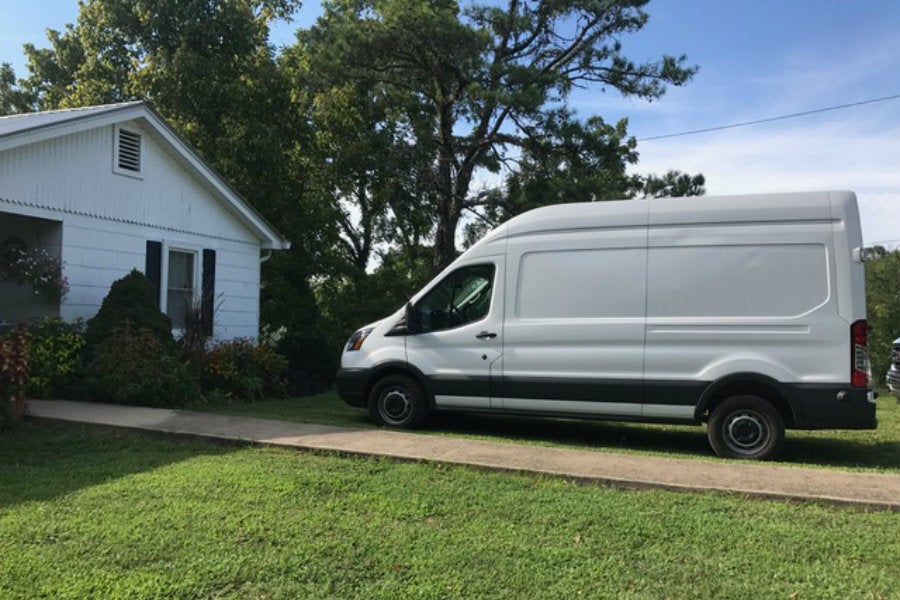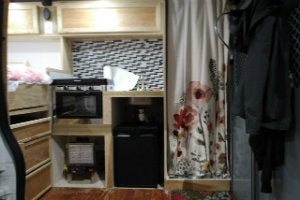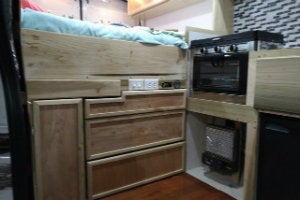Graduate student turned capstone project into an immersive lifestyle, documented it online
Institute for Sustainable Practice alumna Anna McClure fulfilled a dream and assignment by transforming a van into a fully-functioning, sustainable home
Cate Zenzen |

It takes a lot of hard work and motivation for a dream to become reality. For alumna Anna McClure, that motivation was a capstone project for her Masters in Sustainability. McClure used skills from her undergraduate degree in journalism and new media, also from Lipscomb University, to document the process of turning a van into a fully functioning home.
In 2017, McClure was completing a degree within the School of Communication when she enrolled as a graduate student in the Institute for Sustainable Practice. As part of the Master of Science Sustainability program, students are required to design their own capstone project based on their concentration. The project includes a full analysis of the student’s chosen topic with a literature review, analysis of relevant data, written report and oral presentation. McClure, with a concentration on Technical Communication, took a more immersive approach to the assignment and eventually lived in it.
McClure was exposed to the idea of tiny homes and van life in high school and on social media. At the time she worked for a Nashville-based climbing gym where some of her coworkers had experience in converting mobile vans into living spaces. This concept not only interested McClure, but also appeared as a possible solution to a problem.
Before McClure had even graduated with her first degree, she decided to further her education with a masters program. She then had to face the challenges of finding a place to live and roommates to live with. Having moved homes a lot as a child, McClure realized she had gotten attached to having her own space, and began to get nostalgic about moving out of her dorm room after graduation.

The interior of McClure's van during construction.
McClure thought, “What if I could fix those problems and promote what I would be studying all at once? I looked at all the costs, came up with a project proposal and pitched the idea to the sustainability program,” said McClure.
Her professors were impressed with McClure’s creativity and thoroughness throughout her project. Emily Stutzman, academic director and assistant professor in the Institute for Sustainable Practice, said McClure approached her with the idea while still an undergraduate student. Together they sketched a design of the van on the back of a napkin and discussed what it would look like as a capstone project.
“It was an ambitious project, to put it lightly, but I was impressed by her thoroughness and dedication to seeing this through from day one. She used what she was learning in her M.S. in Sustainability not just to inform her design decisions, but during construction she kept track of the carbon embodied in every board and bolt she used. While living in the van, she kept records of water use, electricity generation and use, and waste,” said Stutzman.

McClure enjoyed the lack of stress that came with a small living space.
The real work began as McClure searched for a van to purchase, and the entire remodeling process took a year. With the help of her family, especially her father, McClure eventually had a home on wheels outfitted with solar panels, a working kitchen and plumbing. She used her experience in journalism to document the process on an Instagram account and blog, both titled, “True Cost of Van Life” (view blog here). These outlets helped her report research findings on the economic, environmental and social costs of van life, as well as to highlight the influence of social media on the public’s perception of a mobile lifestyle.
“I realized it was harder than I thought, but it only took me one night staying there to realize it was all worth it. It was a dream come true and there were so many stresses -- environmental, economic and social -- that I didn’t have to think about,” said McClure.
In 2018, McClure left her home in Tennessee to work as a management intern with Acadia Mountain Guides in Orono, Maine. With the van acting as home and transportation, McClure created a standard of living for herself that she found to be a great fit. Throughout her summer internship she continued to record her own impact on the environment, personal financial circumstances, and social well-being.
“Don’t be fooled by how cool her van looks: the biggest transformation wasn’t from a bare-bones delivery van to a tiny van home, but the transformation Anna herself underwent during this project. The confidence she built, the community with other van dwellers, and balance she’s struck between independence and interdependence,” said Stutzman.

Sunrise from home in Acadia National Park. Taken while McClure interned in Maine.
Not only did McClure find this lifestyle to be a good fit for her, but she also thoroughly enjoyed the research surrounding it. She found her courses at Lipscomb, particularly those regarding renewable energy and green building, to be fascinating, and even worked as a Course Developer for the ISP after graduation. These experiences provided an in-depth analysis of different concepts that she could incorporate into her own life. She also appreciated the flexibility of her studies, which enabled her to work on the van while learning about the sustainable practices she hoped her home would embody. Finally, McClure found a supportive community within her program at Lipscomb, a community that provided her the encouragement she needed to complete the project.
McClure retired from van life in August of 2019 and recently moved to Knoxville, TN to begin a PhD program in Education- Learning, Design and Technology. This summer she used the van project as the subject of the design case for a class she audited, and has hopes for publishing her paper in the future. As she continues in her studies, McClure is grateful for her experience of living in the van.
“If you truly dedicate yourself to something, with work and effort, there is not much to stop you from doing it. I set an example of something for my life and made it happen, it has opened up so many opportunities for me,” said McClure.
The Institute for Sustainable Practice in the College of Leadership and Public Service at Lipscomb University offers undergraduate and graduate programs to teach students the science of sustainability. Graduates are equipped to help both businesses and people transform careless behaviors into mindful habits that focus on the triple bottom line: people, profit and planet. Taught by pioneering entrepreneurs, innovative scientists, creative engineers, visionary policy makers and other sustainable leaders, students learn how to make a difference in their communities and the world.